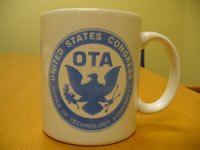The U.S. Congress may have defunded OTA in 1995, but the German Parliament has an Office of Technology Assessment (TAB) that is still alive and producing reports. The summary of one of their recent studies, on “converging technologies”, has recently been translated into English. The author describes converging technologies this way:
“The last twenty years have been marked by drastic political events and by spectacular scientific and technical breakthroughs (such as in the life sciences) and innovations (such as in the case of the Internet). Just as noteworthy in hindsight, however, is the fact that these years appear as a period in which far-reaching technology visions once again attracted serious attention in parts of the scientific community, among politicians, and in the public. In the current discussions about these visions, which were sparked in fields such as nanotechnology and brain research, both cautioners and optimists predict fundamental changes in society, civilisation, and “human nature”.
The debate about “converging technologies” (CT) has to be seen in this context. It has been driven primarily by research policy actors and by experts from various disciplines, and is part of a more comprehensive political and social discourse on nanotechnology, biotechnology, information and communications technology (ICT), brain research, artificial intelligence (AI), robotics, and the sciences that deal with these topics. “Convergence” is an umbrella term for predictions ranging from an increase in synergetic effects to a merging of these fields, and for demands for government funding of research and development where these fields overlap.
The first CT initiative was started in the United States in 2001 in connection with activities concerning social, legal, and ethical aspects of nanotechnology. The primary participants in this initiative were the National Science Foundation and the Department of Commerce, and it received the support, for example, of some of those in military research. Some of the features of this initiative, which despite its nonofficial character is often viewed as an official government initiative, triggered some very controversial discussions. The subject was even picked up by some of the mass media, nongovernmental organisations (NGO), and private enterprises. For analytical purposes, we can distinguish between:
- A debate that started in the United States, bundled various social conflicts concerning science and technology, and focused on “human enhancement”, i.e., the artificial improvement of an individual’s capacities, and on far-reaching visions of the future of humanity;
- The discussions about CT research policy in a narrower sense and the related scientific and technological activities. Here too the starting point was in the United States, but the main participants driving this field are now located in Europe.”
The entire report (in German) can be found here.
Click here for a brief summary and here for an extended article about this new TAB report posted on nanowerk.com.


